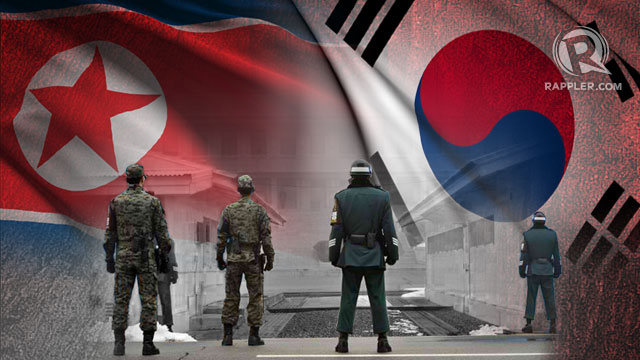SUMMARY
This is AI generated summarization, which may have errors. For context, always refer to the full article.

SEOUL, South Korea – (UPDATED) Embassies are considering evacuation in North Korea after a warning that their safety cannot be guaranteed starting Wednesday, April 10. But most governments of the European Union made it clear they had no plans to withdraw any personnel.
A British foreign office spokeswoman said Pyongyang had warned that “from April 10 (it) would be unable to guarantee the safety of embassies and international organizations in the country in the event of conflict.”
“We believe they have taken this step as part of their country’s rhetoric that the US poses a threat to them,” the spokeswoman said.
The warning coincided with reports that North Korea had loaded two intermediate-range missiles on mobile launchers and hidden them in underground facilities near its east coast.
Foreign diplomats huddled about their safety in Pyongyang to discuss the North Korea warning but some EU diplomats suggested the advisory was a ruse to fuel growing global anxiety over the current crisis on the Korean peninsula.
The United Nations also said it had no plans to pull out staff, although spokesman Martin Nesirky said UN chief Ban Ki-moon was “studying the message,” and added that UN staff “remain engaged in their humanitarian and developmental work” throughout North Korea.
Russian Foreign Minister Sergei Lavrov said Moscow was consulting with China over the warning, as well as the United States and other members of the stalled six-party talks on North Korea.
“Our understanding is that the North Koreans were asking whether embassies are intending to leave, rather than advising them to leave,” the British foreign office spokeswoman said. They were reportedly asked by Pyongyang what assistance they needed should they wish to evacuate.
Missiles
“The North is apparently intent on firing the missiles without prior warning,” the South’s Yonhap news agency quoted a senior government official as saying.
They were reported to be Musudan missiles, which have never been tested, but are believed to have a range of around 3,000 kilometers (1,860 miles), which could theoretically be pushed to 4,000 with a light payload.
That would cover any target in South Korea and Japan, and possibly even reach US military bases located on the Pacific island of Guam.
On Friday, April 5, North Korea warned foreign embassies that in the event of conflict, it is unable to guarantee their safety. The government also said diplomats should consider evacuating missions by next week.
‘Unconstructive rhetoric’
The White House said Friday it “would not be surprised” by a missile test.
“We have seen them launch missiles in the past…. And it would fit their current pattern of bellicose, unhelpful and unconstructive rhetoric and actions,” White House spokesman Jay Carney said.
The Pentagon warned any such test would be “a provocative act,” with spokesman George Little urging Pyongyang to “follow international norms and abide by their commitments.”
Threats and concern
North Korea, incensed by UN sanctions and South Korea-US military drills, has issued a series of apocalyptic threats of nuclear war in recent weeks.
The North has no proven inter-continental ballistic missile capability that would enable it to strike more distant US targets, and many experts say it is unlikely it can even mount a nuclear warhead on a mid-range missile.
Nevertheless, the international community is becoming increasingly skittish that, with tensions showing no sign of de-escalating, there is a real risk of the situation spiralling out of control.
The latest expression of concern came from Communist icon Fidel Castro, who warned the danger of a nuclear conflict erupting was higher than it had been at any time since the 1962 Cuban missile crisis.
If war broke out on the Korean peninsula, “there would be a terrible slaughter of people,” Castro wrote in a front-page article in Granma, the Cuban Communist Party’s newspaper.
Last week, North Korea also declared it was at war with South Korea. On April 4, it also vowed “merciless” military strikes on the US, using “cutting-edge” nuclear weapons.
On March 21, the North Korean army threatened a possible strike against US military bases in Japan, in response to the use of nuclear-capable US B-52 bombers in joint military drills with South Korea. The day before on March 20, Pyongyang condemned the B-52 flights as an “unpardonable provocation” and threatened military action if they continue.
The recent nuclear tensions erupted when North Korea fired a long-range rocket on December 12 that splashed near the Philippines.
Pyongyang said it was a peaceful satellite launch and US experts acknowledged that the regime put a small object into orbit.
In South Korea, a Navy official told Yonhap that two Aegis destroyers with advance radar systems had been deployed — one off the east coast and one off the west coast — to track any missile launch. – with a report by Cai Ordinario/ Rappler.com
Add a comment
How does this make you feel?
There are no comments yet. Add your comment to start the conversation.